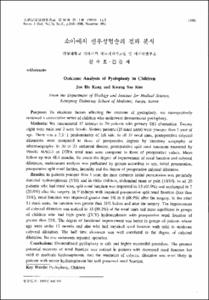소아에서 신우성형술의 결과 분석
- Keimyung Author(s)
- Kim, Kwang Sae
- Journal Title
- 대한비뇨기과학회지
- Issued Date
- 1997
- Volume
- 38
- Issue
- 11
- Abstract
- Purpose: To elucidate factors affecting the outcome of pyeloplasty, we retrospectively reviewed a consecutive series of children who underwent dismembered pyeloplasty. Methods: We encountered 37 kidneys in 30 patients with primary UPJ obstruction. Twenty eight were male and 2 were female. Sixteen patients (19 renal units) were younger than 1 year of age. There was a 2.3: 1 predominance of left side. In all 37 renal units, postoperative calyceal dilatations were compared to those of preoperative degrees by excretory urography or ultrasonography. In 20 of 23 unilateral disease, postoperative split renal functions measured by 99mTc MAG-3 or DTPA renal scan were compared to those of preoperative values. Mean follow up was 48.4 months. To assess the degree of improvement of renal function and calyceal dilatation, multivariant analysis was performed by groups according to age, initial presentation, preoperative split renal fuction, laterality and the degree of preoperative calyceal dilatation. Results: In patients younger than 1 year, the most common initial presentation was prenatally detected hydronephrosis (9/16) and in older children, abdominal mass or pain (10/14). In all 20 patients who had renal scan, split renal function was improved in 13 (65.0%) and unchanged in 7 (35.0%) after the surgery. In 9 kidneys with impaired preoperative split renal function (less than 35%), renal function was improved greater than 5% in 8 (88.9%) after the surgery. in the other 11 renal units, the function was greater than 35% before and after the surgery. The improvement of calyceal dilatation was noticed in 33 (89.2%) of the renal units and more significant in groups of children who had high grade (IV,V) hydronephrosis with preoperative renal function of greater than 35%. The degree of functional improvement was better in groups of patients whose age were under 12 months and also who had impaired renal function with mild to moderate calyceal dilatation. The half time clearance was well correlated to the degree of calyceal dilatation. No one underwent repeated operation. Conclusions: Dismembered pyeloplasty is safe and highly successful procedure. The greatest potential recovery of renal function was noticed in patients with decreased renal function but mild to moderate hydronephrosis. And the resolution of calyceal dilatation was most likely in patients with severe hydronephrosis but well preserved renal function.
Key word : pyeloplasty, children.
- Alternative Title
- Outcome Analysis of Pyeloplasty in Children
- Keimyung Author(s)(Kor)
- 김광세
- Publisher
- School of Medicine
- Citation
- 강주호 et al. (1997). 소아에서 신우성형술의 결과 분석. 대한비뇨기과학회지, 38(11), 1196–1201.
- Type
- Article
- ISSN
- 2005-6737
- Appears in Collections:
- 1. School of Medicine (의과대학) > Dept. of Urology (비뇨의학)
3. Research Institutues (연구소) > Institute for Medical Science (의과학연구소)
- 파일 목록
-
-
Download
 oak-bbb-1349.pdf
기타 데이터 / 192.03 kB / Adobe PDF
oak-bbb-1349.pdf
기타 데이터 / 192.03 kB / Adobe PDF
-
Items in Repository are protected by copyright, with all rights reserved, unless otherwise indicated.